People Analytics Is Viewed as a 'Nice-to-Have', but Proves to Be a 'Need-to-Have'
People analytics needs a PR campaign

People analytics is often perceived as a luxury HR function. The number of people analytics positions has been declining in recent years: Unlike core HR functions like payroll, people analytics roles are more sensitive to interest rate hikes and the business cycle, making them more vulnerable to budget cuts during periods of financial tightening.
However, people analytics professionals are among the most highly skilled individuals in the HR field. They are more likely to hold doctoral degrees compared to their peers in other HR roles and tend to possess exceptional analytical skills.
Companies with dedicated people analytics teams have higher employee sentiment ratings, reflecting the positive impact of data-driven decision-making and strategic workforce planning.
People analytics is a relatively young HR function that focuses on using data-driven approaches to optimize workforce management and decision-making. This field combines elements of data science, statistics, and human resource management to help organizations make evidence-based decisions that enhance overall productivity and employee satisfaction. As businesses increasingly recognize the value of data in driving HR strategies, people analytics has been gaining substantial traction and is becoming an integral part of contemporary HR practices. This week, in collaboration with Cole Napper’s Directionally Correct newsletter, we explore recent trends in people analytics and assess how this field can distinguish itself from other HR functions and evolve into a core component of HR strategy.
Fueled by the growing recognition of the importance of data-driven decision-making in HR, the number of people analytics positions grew steadily over several years: The number of professionals working in people analytics in the US rose from 7.5K in 2016 to just under 12K in 2022. However, this figure began declining in late 2022 and has now fallen closer to 10K.

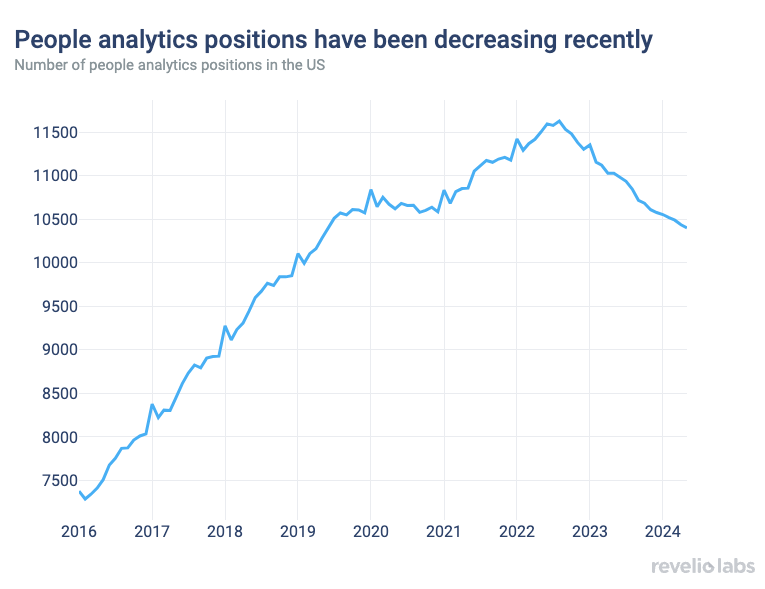
Sign up for our newsletter
Our weekly data driven newsletter provides in-depth analysis of workforce trends and news, delivered straight to your inbox!
Part of the decline can be attributed to the recent interest rate hikes and resulting higher cost of capital, which have led to tighter budgets and cost-cutting measures across organizations. Using a core HR function like payroll specialist as a control group, we compare the change in the number of people analytics and payroll specialist positions between the high-interest-rate period in Q4 2023 and the low-interest-rate period in Q4 2021. Our premise is that payroll serves as a baseline for what happened to “normative” or “typical” HR roles over the last two years. While there was only a 0.6% decrease in payroll specialist positions during this period, we observe a significantly larger decline of 5% in people analytics positions over the same timeframe.
As companies face increased financial pressure, investments in people analytics and other perceived non-essential functions are often reduced or postponed. Additionally, economic uncertainty has prompted businesses to prioritize immediate operational needs over long-term strategic initiatives like people analytics. These adjustments have contributed to the decline in the number of people analytics positions and a slowdown in the field's overall growth.

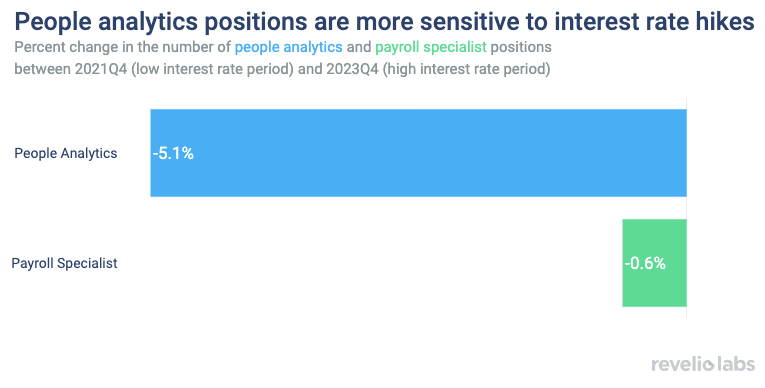
However, it is important to recognize that people analytics professionals continue to be some of the most highly skilled individuals in the HR field. A closer look at their educational backgrounds reveals a distinct difference when compared to other HR specialists. People analytics professionals are notably more likely to hold advanced degrees, with a higher proportion possessing doctoral degrees, underscoring the specialized expertise required for success in this area.

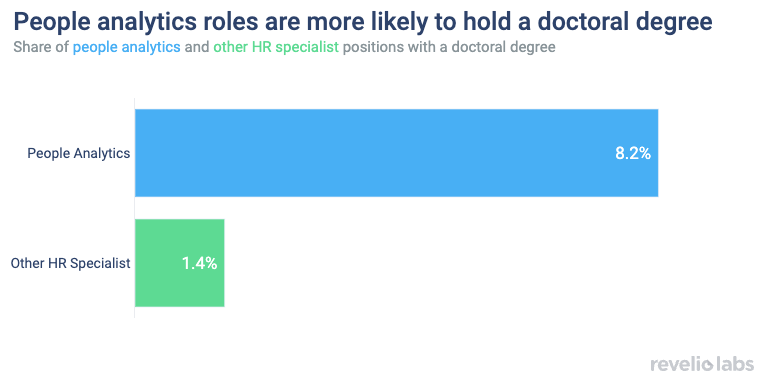
In addition, people analytics professionals are more likely to excel in roles that require advanced analytical capabilities, including data analysis and business intelligence. They often possess a strong technical toolkit, being more likely to have skills such as SQL compared to other HR specialists. This combination of analytical and technical expertise uniquely positions them to inform strategic decision-making within organizations.

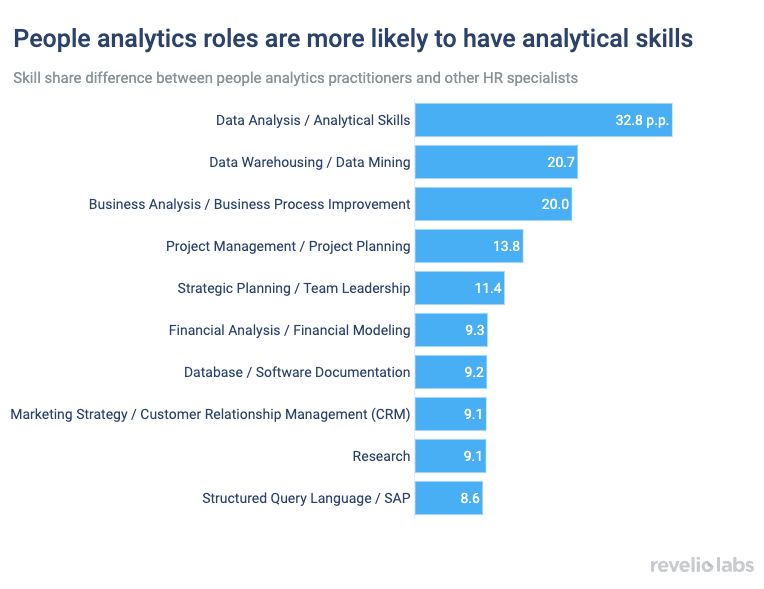
With a unique skill set and impressive educational backgrounds, people analytics teams bring valuable insights and capabilities to organizations. When comparing companies with dedicated people analytics teams to their competitors without such teams—identified using our competitor model that factors in industry and company size—we find that employee sentiment ratings are higher across multiple categories of employee satisfaction. This suggests that organizations leveraging people analytics teams may foster a more positive workplace environment. It also highlights the positive impact that data-driven decision-making and strategic workforce planning can have on overall company performance, employee satisfaction, and organizational effectiveness.

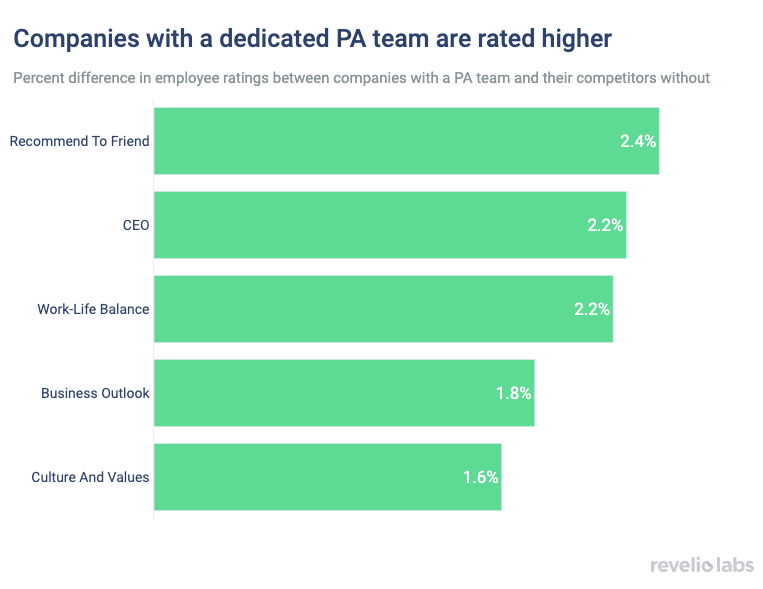
To establish people analytics as an indispensable and essential HR function, practitioners must align their initiatives with the organization’s strategic objectives, focusing on addressing real business challenges such as improving productivity, boosting retention, and reducing costs to demonstrate tangible impact. Equally important is the ability to communicate insights effectively, using clear, actionable data and storytelling to drive positive business outcomes. Highlighting how people analytics can enhance the employee experience—from hiring and engagement to employee satisfaction—reinforces its significance in HR. Building cross-functional partnerships with departments like finance and IT can broaden its influence, while continuous learning in areas like AI and predictive analytics strengthens both credibility and overall effectiveness.

